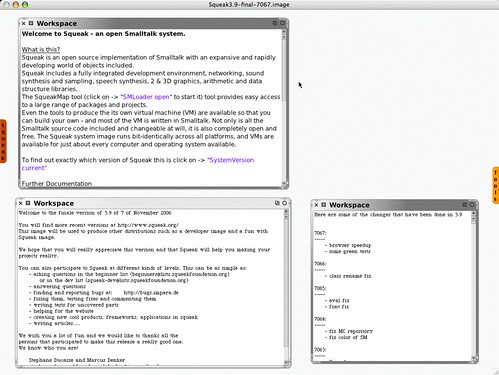Seaside does not have a marketing problem!
Everyone I know in this business knows about Seaside and its super productive powers. We've all seen the demos and the screencasts and the awesomeness that is DabbleDB. For god's sake, Avi gave a keynote at RailsConf this year.
I think it's safe to say that people know about Seaside.
The problem at this point isn't a marketing one. It's the same problem that Squeak has always had. Namely that when you download Squeak and start it up, you're presented with this:

When most programmers I know see this, they have the same reaction, "What the fuck?"
This is usually followed quickly by the question of, "Can I edit this using Vi or Emacs?"
Let me answer this now. No and No.
If you're the type of person that can't imagine giving up writing code at the command line, then Squeak isn't for you. (Although there are Vi and Emacs keybindings.)
And that's usually the end of it. People play with Squeak for a few minutes and then go back to doing their real work in Ruby or Python or Java or C#. A lot of the power and magic of using Seaside is directly derived from the power and magic of using Smalltalk, which unfortunately (or fortunately, depending on your point of view) means that you're going to have to learn Smalltalk if you want to use it .
And Smalltalk is, at least in the case of Squeak, a whole different world. You have to unlearn a lot of what you know in order to use it. Editing is different, class creation is different, version control is different. Basically everything you know as a programmer gets thrown out the window.
But you know what? At some point, once you do that and really start to immerse yourself in Smalltalk, you'll suddenly realize that it's hard to go back to the old way of doing things.
You'll realize how much easier it is to just ask the system what method you should use to get something done instead of going to a PDF document somewhere to look it up. (Yes, in Squeak you can just type "'class'. 3. 'cla'" into the the method finder and tells you that "contractTo" and "truncateTo" are the two messages in the system that give you that result.)
You'll suddenly come to the realization that this is simply better.
That this is how things are supposed to work.
Unfortunately for most of us at this point, we'll have to go back to our real jobs, (I asked Avi after his keynote how many people in the world are actually making money using Seaside and he said that he figures about 20) but even if you get this far you'll learn enough to to have a whole new outlook on how coding should work.
It's not a marketing problem, it's the the same old problem that people are scared of things that are different then what they're used to. Hopefully someday we will be able to overcome this fear, and then Seaside and Smalltalk will finally take over the world. But for now this new outlook on development will have to be good enough.